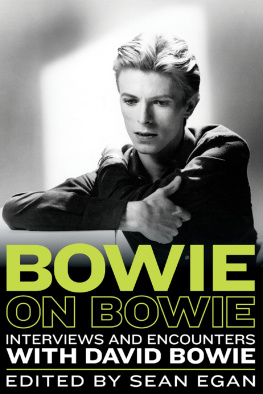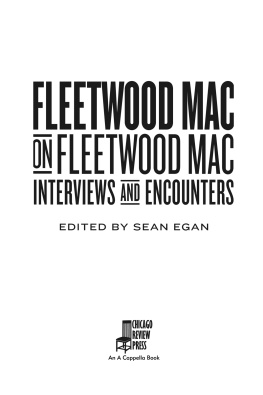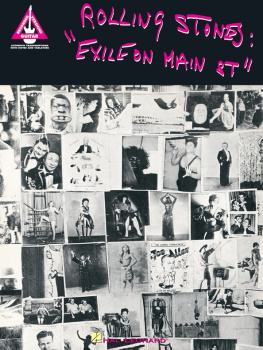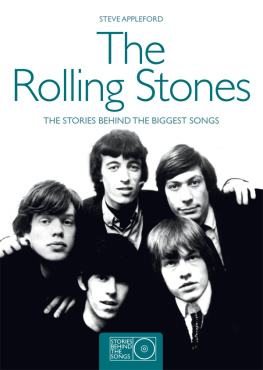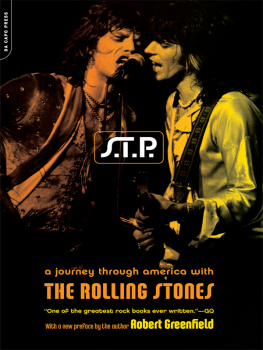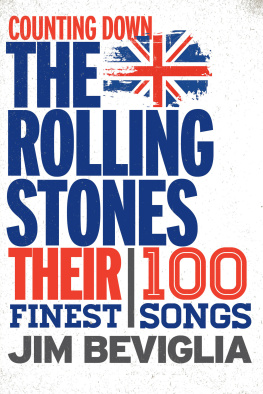Sean Egan - The Mammoth Book of the Rolling Stones
Here you can read online Sean Egan - The Mammoth Book of the Rolling Stones full text of the book (entire story) in english for free. Download pdf and epub, get meaning, cover and reviews about this ebook. publisher: Little, Brown Book Group, genre: Detective and thriller. Description of the work, (preface) as well as reviews are available. Best literature library LitArk.com created for fans of good reading and offers a wide selection of genres:
Romance novel
Science fiction
Adventure
Detective
Science
History
Home and family
Prose
Art
Politics
Computer
Non-fiction
Religion
Business
Children
Humor
Choose a favorite category and find really read worthwhile books. Enjoy immersion in the world of imagination, feel the emotions of the characters or learn something new for yourself, make an fascinating discovery.
- Book:The Mammoth Book of the Rolling Stones
- Author:
- Publisher:Little, Brown Book Group
- Genre:
- Rating:5 / 5
- Favourites:Add to favourites
- Your mark:
- 100
- 1
- 2
- 3
- 4
- 5
The Mammoth Book of the Rolling Stones: summary, description and annotation
We offer to read an annotation, description, summary or preface (depends on what the author of the book "The Mammoth Book of the Rolling Stones" wrote himself). If you haven't found the necessary information about the book — write in the comments, we will try to find it.
The Mammoth Book of the Rolling Stones — read online for free the complete book (whole text) full work
Below is the text of the book, divided by pages. System saving the place of the last page read, allows you to conveniently read the book "The Mammoth Book of the Rolling Stones" online for free, without having to search again every time where you left off. Put a bookmark, and you can go to the page where you finished reading at any time.
Font size:
Interval:
Bookmark:
Londoner Sean Egan has contributed to, among others, Billboard, Book Collector, Classic Rock, Record Collector, Tennis World, Total Film, Uncut and RollingStone.com . He has written or edited nineteen books, including works on The Beatles, Jimi Hendrix, The Rolling Stones, Coronation Street, Manchester United and Tarzan. His critically acclaimed novel Sick of Being Me was published in 2003, while Dont Mess with the Best, his 2008 collection of short stories, carried cover endorsements from Booker Prize winners Stanley Middleton and David Storey.
Recent Mammoth Titles
The Mammoth Book of New Sherlock Holmes Adventures
The Mammoth Book of Weird News
The Mammoth Book of Undercover Cops
The Mammoth Book of Antarctic Journeys
The Mammoth Book of Muhammad Ali
The Mammoth Book of Best British Crime 9
The Mammoth Book of Conspiracies
The Mammoth Book of Lost Symbols
The Mammoth Book of Nebula Awards SF
The Mammoth Book of Body Horror
The Mammoth Book of Steampunk
The Mammoth Book of New CSI
The Mammoth Book of Gangs
The Mammoth Book of SF Wars
The Mammoth Book of One-Liners
The Mammoth Book of Best New SF 25
The Mammoth Book of Jokes 2
The Mammoth Book of Horror 23
The Mammoth Book of Slasher Movies
The Mammoth Book of Street Art
The Mammoth Book of Ghost Stories by Women
The Mammoth Book of Irish Humour
The Mammoth Book of Unexplained Phenomena
The Mammoth Book of Best British Crime 10
The Mammoth Book of Combat
The Mammoth Book of Dark Magic
The Mammoth Book of Angels and Demons
The Mammoth Book of New Sudoku
The Mammoth Book of Zombies
The Mammoth Book of Covert Ops
Stones
Sean Egan

Constable & Robinson Ltd
5556 Russell Square
London WC1B 4HP
www.constablerobinson.com
First published in the UK by Robinson,
an imprint of Constable & Robinson Ltd, 2013
Copyright Sean Egan, 2013
The right of Sean Egan to be identified as the author of this work has been asserted by him in accordance with the Copyright, Designs & Patents Act 1988.
All rights reserved. This book is sold subject to the condition that it shall not be reproduced in whole or in part, in any form or by any means, electronic or mechanical, including photocopying, recording, or by any information storage and retrieval system now known or hereafter invented, without written permission from the publisher and without a similar condition, including this condition, being imposed on the subsequent purchaser.
A copy of the British Library Cataloguing in Publication
Data is available from the British Library
UK ISBN: 978-1-78033-646-6 (paperback)
UK ISBN: 978-1-78033-647-3 (ebook)
1 3 5 7 9 10 8 6 4 2
First published in the United States in 2013 by Running Press Book Publishers, A Member of the Perseus Books Group
All rights reserved under the Pan-American and International Copyright Conventions
Books published by Running Press are available at special discounts for bulk purchases in the United States by corporations, institutions, and other organizations. For more information, please contact the Special Markets Department at the Perseus Books Group, 2300 Chestnut Street, Suite 200, Philadelphia, PA 19103, or call (800) 810-4145, ext. 5000, or e-mail .
US ISBN: 978-0-7624-4814-2
US Library of Congress Control Number: 2012942537
9 8 7 6 5 4 3 2 1
Digit on the right indicates the number of this printing
Running Press Book Publishers
2300 Chestnut Street
Philadelphia, PA 19103-4371
Visit us on the web!
www.runningpress.com
Printed and bound in the UK
Cover photograph: Michael Putland; Cover design: www.simonlevyassociates.co.uk
Its hard to remember just what that period was like, Mick Jagger said of the sixties in 1987, but I can assure you it was extremely different from now. Things you take for granted now they wouldnt then: social values, the way people mix, racial segregation, sexual segregation and orientation, the opportunities people would or wouldnt have, class and money.
What Jagger was uncharacteristically too modest to say was that so many of those injustices were rectified partly because of the group of which he has now been the lead singer for half a century. The Rolling Stones were unlike any rock or pop ensemble before them in their refusal to wear a suit uniform, their unruly mops of hair and their shrugged dismissal in both interviews and recordings of social conformity and tradition. Whereas The Beatles, at first anyway, were smiling and solicitous, the Stones casualness and surliness seemed to represent a new social order: an antidote to a censorious, authoritarian and grey society, whether it be class-bound Britain, white-picket-fence America or communist-yoke Russia. As the years passed, the young increasingly emulated and took their cue from the Stones outlaw attitude. So seriously did the Establishment take their enemies-of-society mien that in 1967 Jagger and Stones guitarist Keith Richards were given harshly discriminatory prison sentences for drugs offences, while fellow guitarist Brian Jones was hounded by the police via repeated raids in suspicious circumstances. Nothing the Establishment did, however, would stop the Stones influence seeping into the DNA of the generation about to assume power.
Meanwhile, the band effortlessly made classic records, moving with awe-inspiring speed from being the best rhythm-and-blues covers merchants on the scene to creating their own sound via the Jagger/Richards songwriting axis that swiftly rivalled Lennon/McCartney. They defiantly littered the buttoned-up sixties with brilliant 45 rpm anthems of disaffection and sensuality like (I Cant Get No) Satisfaction and Lets Spend the Night Together, while turning out classic albums like Aftermath, Beggars Banquet and Let It Bleed. Come the seventies, the disintegration of The Beatles and their own appointment of virtuoso guitarist Mick Taylor saw the Stones acquire a new swaggering, if wasted, confidence. They became the undisputed template for a rock band via their manes of rebelliously long hair, their gargantuan and decadent tours, and masterpiece LPs like Sticky Fingers and Exile on Main St.
Although marriage, family and sated artistic hunger plus the emergence of younger, more relevant acts inevitably meant a dilution of their impact and powers, the Stones were still able to knock out the odd superb record like 1978s Some Girls, while their enduringly profitable tours proved what nobody had suspected back when they started: that a rock band could remain active and sustain appeal across generations.
The Mammoth Book of The Rolling Stones presents a bumper collection of writing, old and new, on the group correctly described at various times as both The greatest rock n roll band in the world and A way of life.
Sean Egan
John Pidgeon
First published on www.rocksbackpages.com , April 2009
The first time I hear Cyril Davies blow his harmonica is January 1963 at Leos Jazz Club in Windsor. As I approach, shoulders hunched against the cold, I watch billows of cigarette smoke, lit pink and yellow by the lights inside, spill from an open door, before the thin, chill evening air is split by an inhuman scream, a siren wail that rises a tone, then subsides. The sound nails me momentarily to the pavement, then propels me to the entrance of an unprepossessing British Legion Hall, which by day is a hang-out for pensioners who have served time, as most have, in the armed forces. At a folding table by the door I fumble distractedly in my pocket for the four shilling (20p) entry fee, entirely absorbed by the source of this extraordinary sound: a balding, badly dressed man, who looks middle-aged to my teenage eyes.
Next pageFont size:
Interval:
Bookmark:
Similar books «The Mammoth Book of the Rolling Stones»
Look at similar books to The Mammoth Book of the Rolling Stones. We have selected literature similar in name and meaning in the hope of providing readers with more options to find new, interesting, not yet read works.
Discussion, reviews of the book The Mammoth Book of the Rolling Stones and just readers' own opinions. Leave your comments, write what you think about the work, its meaning or the main characters. Specify what exactly you liked and what you didn't like, and why you think so.




